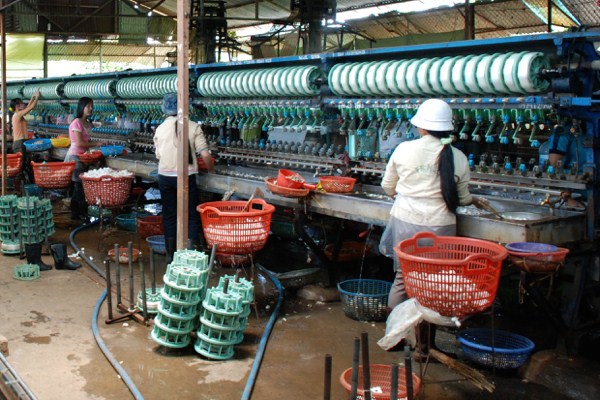A weeklong strike by tens of thousands of Vietnamese workers at the Taiwanese-owned Pou Yuen footwear factory in Ho Chi Minh City earlier this month exposed the severely eroded authority of Vietnam’s ruling Communist Party, which is failing to keep the lid on a rising tide of labor disputes even as it promotes Vietnam as Asia’s next manufacturing hub. It was more than a rare challenge to the party. The strike extracted a concession from Prime Minister Nguyen Tan Dung’s government, with authorities agreeing to workers’ demands to amend a new social insurance law that would have restricted lump sum payouts for workers leaving their jobs. In doing so, the strike highlighted a growing alignment of interests among workers, their local employers and major international companies like Nike and Adidas, though it is not yet clear where this could lead. Simmering worker unrest shows how tactical power in Vietnam is shifting away from the Politburo, which has shown little desire to pursue political reform despite the country’s economic growth.
Often lauded as the authors of “doi moi,” a program of economic reforms introduced in 1986, the Communist Party survived the fall of the Soviet Union thanks to strongly commercialized state enterprises that used their business acumen, built up in the 1980s, to thrive after the opening of borders with China in the 1990s. But Vietnam’s rapid economic growth in the last decade brought rampant corruption in the form of steady bribes and kickbacks for party officials, as well as largesse from large Western aid programs. That all led to complacency from communist authorities to respond to new popular expectations for reform that have come with prosperity. Despite Vietnam’s transition to middle-income country status, with poverty declining from 58 percent in the early 1990s to around 10 percent by 2010, progress has been undermined by the government’s inability to deal with corruption, secure decent public education and health care,and successfully manage urbanization, all of which has damaged its popular legitimacy.
One-party rule is still harshly enforced, with security forces increasingly deployed against dissidents and political activists. But things are different with labor, as the government is careful when dealing with disgruntled and rebellious farmers and workers, since their groups are large, organized, deeply angry with the political situation and hard to intimidate. But the absence of reform means that the avenues for organized political activity remain effectively Leninist, with the official trade unions funded by the state but lacking political relevance and legitimacy. In settling disputes like the recent Pou Yuen factory strike, Vietnam’s Communist Party, in practice, must talk to workers’ own representatives, even though they are limited in how they can organize.

